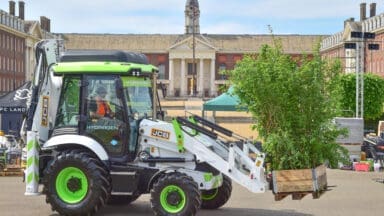
In a step towards environmentally conscious building, Jo Thompson and her team are using JCB’s hydrogen-powered machine for the heavy lifting during the garden’s construction, including moving Zelkova serrata trees, mixed native hedging and large pallets of reclaimed stone. The machinery produces zero carbon emissions and emits only clean steam.
“This is a working demonstration model and a glimpse of the future,” says Jo Thompson. “We’ve thought about sustainability in every part of this garden – materials, planting, and how we build it. Having the machine here is an important step toward a more sustainable future at Chelsea – and we’re proud to be the first to do it.”
Supported by Project Giving Back, the Glasshouse Garden, celebrates the support, inspiration and hope provided by the Glasshouse – a pioneering social enterprise offering second chances to women nearing the end of their prison sentences through horticultural training, employment, and resettlement support. Inspired by the work of the Glasshouse, the garden promises to be an immersive, hopeful and reflective space.
Thompson explains that from the build to the materials used, the Glasshouse Garden is a statement of sustainable design. Using green hydrogen from renewable energy sources, the garden’s construction using of JCB’s Hydrogen-powered machinery is generating only clean steam – zero emissions. The garden’s central pavilion frame has been manufactured from 50% recycled steel, with screens made from recycled acrylic in four botanical-inspired tints. The stone which forms the garden paths, pavilion floor and rill is made from reclaimed British stone, sourced as waste or by-product from small UK quarries. No raw materials are being used, as all the detailing is made from construction offcuts. The garden features eco-sensitive elements such as self-seeded pathways and sedum roofing enhance biodiversity and aid rainwater management. The furniture (Bonacina) is crafted from recycled materials that mimic natural rattan, providing long-lasting, weatherproof seating inside the pavilion.
Tim Burnhope, Group Director Special Projects, JCB said: “JCB is delighted to be associated with this year’s RHS Chelsea Flower Show and the build of The Glasshouse Garden. The machine supporting the show garden build is a backhoe loader – the classic JCB digger – with a hydrogen combustion engine under the bonnet. The engine is fuelled by hydrogen gas, a zero CO2 fuel rather than diesel, which is a fossil fuel. JCB is the first in the world to deploy this technology in machinery like this and it’s perfect for sustainable construction.”
“If widely adopted by 2030, hydrogen-powered construction equipment could help avoid 30–50 million tons of CO₂ emissions globally — equivalent to planting a billion trees or eliminating the annual emissions of a country like Ireland,” adds Thompson.
JCB is a UK manufacturer of construction equipment. The company’s Chairman, Anthony Bamford is personally spearheading the company’s £100 million project to develop hydrogen combustion engine technology as part of the firm’s Off Road to Zero sustainability programme.

